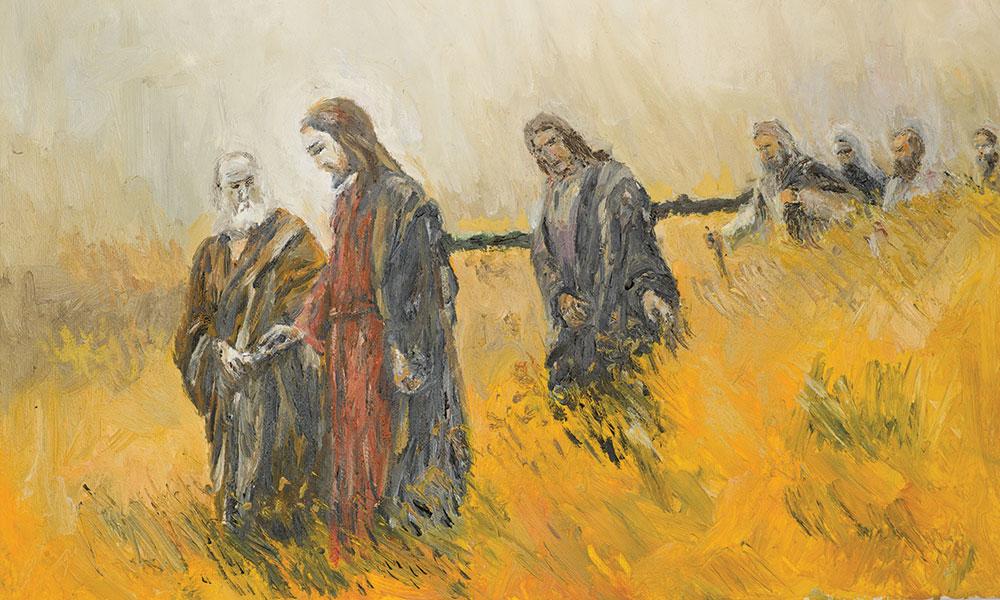
Does God Just Coerce People into Following Him?
I have recently been reading the Old Testament and have encountered some things that have troubled me. Among them is the way God talks about blessing those who obey him and cursing those who disobey him. I much prefer the New Testament and how Jesus reveals that God is love and calls us to love him. This just seems like God is coercing people into following him. What do I do?
The fact that you are wrestling with this demonstrates that you have an issue and are willing to engage with it rather than just ignore it. These are the kinds of questions that can lead to a deepening and maturing of faith, so I am very glad that you asked about this.
Your observation is one that others have made as well. In our times, few people are familiar with the entire Bible. We might just be knowledgeable about certain verses or certain “ideas” that are found in Scripture. When we encounter the fullness of the Bible, it can confront us with elements we had not considered before.
Further, what you noted can make a relationship with God seem incredibly “transactional”; the reason you follow him is to get good things and to avoid getting bad things. Even more, you noted that this seems to impugn the character of God, as well, and makes it look like he is willing to curse or bless people depending on how they respond to him.
But let’s consider a few important points.
You indicate that you are troubled by the fact that there are blessings connected with obeying God and curses connected with disobeying God. I can understand that this kind of thing might bother some people. But let’s also look at two things: human nature and the world around us.
The world around us is completely filled with a thing that most people prefer to avoid: consequences. Every choice we make has consequences attached to it. We do not live in a world where we can make choices without also being willing to accept the consequences of those choices. Many times, those consequences have the positive effect of shaping our choices. (I choose not to eat the second double cheeseburger because I do not want to live with the consequences of eating the second double cheeseburger.) The fact that consequences exist does not mean that I am being coerced into eating only one cheeseburger. The consequences reveal what I’m truly choosing when I make decisions.
Let’s emphasize that point: Consequences reveal what we are actually choosing when we make decisions. A person chooses to have the extra drink, and later realizes that what they’ve really chosen was a headache the next day, or they may discover that they have taken another step towards becoming dependent on alcohol. A person chooses to play video games and later realizes that what they’ve really chosen was to get a bad grade on the assignment that was due the following day. A parent chooses to scroll on their phone to get the latest updates on their friends and news in the world, and later realizes that what they’ve really chosen was to create distance between them and their spouse or children.
There are an infinite number of examples in our own lives that each one of us could think of, and they all do the same thing: They are all oriented towards making us more free or more enslaved, more wise or more foolish.
God’s laws are the same. God makes it clear that he desires for human beings to live in a certain way. If we live the way he has revealed, we become free and wise. If we defy his will and his commandments, we become enslaved and foolish. This happens all of the time, and it happens regardless of our wanting it to. They are not arbitrary consequences. They are inherent in the very act of choosing.
One of the things that holds us up is that we imagine that God’s “blessing and cursing” is arbitrary. It is not. The blessings are the intrinsic result of choosing to obey him, and the curses are the intrinsic result of choosing to disobey him. He is not coercing people into obedience by holding out a carrot (or being willing to use a stick), he is revealing what kinds of behaviors lead to life and which kind lead to death.
And this leads us to the second thing we need to acknowledge: human nature. I wonder if we aren’t being too generous with ourselves if we think that we don’t need rewards and punishments in our lives. Let’s even simply imagine that all of God’s laws are just that, rewards and punishments. Let’s say that the blessings and curses of Deuteronomy are even arbitrary. Would anyone be willing to assert that human beings are so good that we wouldn’t still need them? Every parent knows that children learn what is right and wrong through a system of reward and punishment. Hopefully, that system is just and fair and good, but it will be a system of “blessing and cursing” nonetheless. And this is how human beings learn. This, in fact, is how we have to learn.
If we are ever to get to the place where we are willing to do the right thing “for its own sake,” we have to learn via the system of consequences. Yes, the goal is to be people who love God for his own sake and not out of a fear of hell or a selfish desire for heaven, but none of us automatically have that kind of love in us. That kind of love is more mature than most people have in them. It has to be cultivated and taught. The “blessings and curses” are the way our good Father in heaven is teaching us how to love.
Last thing: Whenever we read a challenging piece of Scripture, I always encourage people to “keep reading.” For example, a person might wrongly have the impression that the New Testament doesn’t talk about things like hell or how loving God looks like obeying him. But what we find is that Jesus talks more about hell than anyone else in the entire Bible. (Yes! Loving and gentle Jesus!) He does this because he actually loves people and doesn’t want them to experience that consequence of disobedience. Jesus is also the one who says, “If you love me you will keep my commandments.” Even in the New Testament, God reveals that obedience and love are intrinsically connected.
And the same is true in the Old Testament. In the chapter of the book of Deuteronomy immediately following the blessings and curses (Chapter 30), God reveals the motive for the punishments he is willing to allow: so that you may be brought back home after having been scattered, so that you may be gathered into God’s loving arms after you have been isolated, and that you might “love the Lord, your God, with all your heart and all your soul, and so may live” (Deuteronomy 30:6). God wants us to live and love, that is why he lets us choose it freely.



